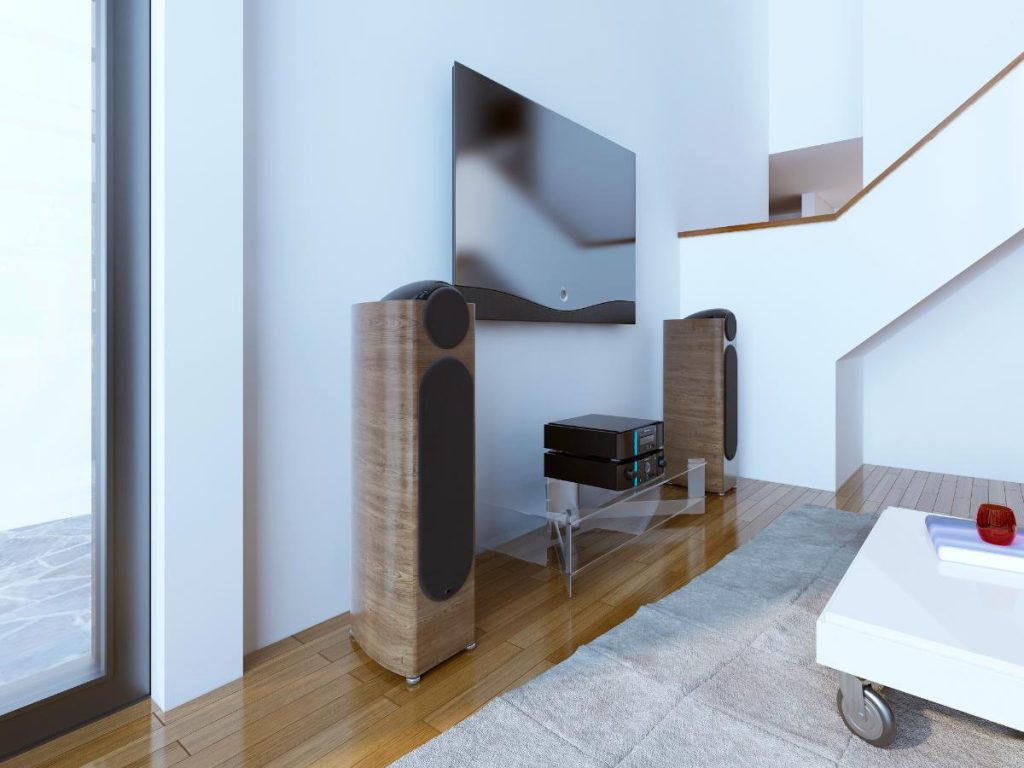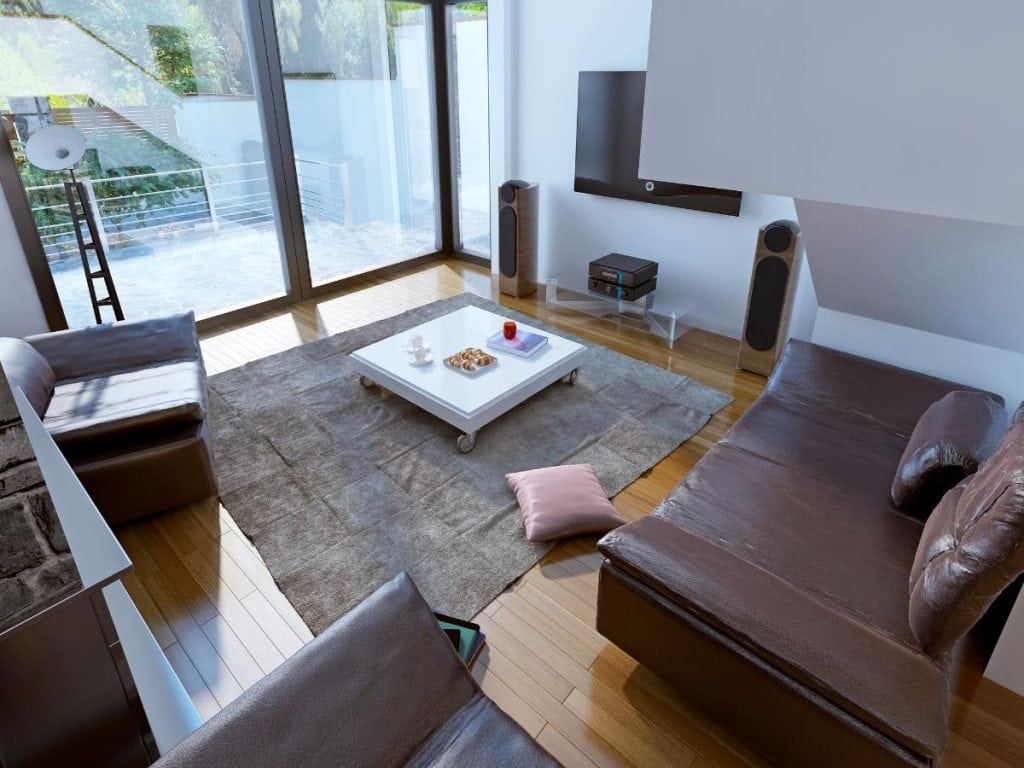Years ago, figuring out how to build a sound system at home meant choosing between a few standard components. Today’s options offer incredible possibilities but can feel overwhelming for anyone starting their audio journey.
Music enthusiasts looking for professional home sound system installation often discover that the right equipment differentiates between merely hearing music and genuinely experiencing it. The choices made early in the process can affect enjoyment for years.

Why Better Sound Matters?
Remember that feeling when you first heard your favorite song through an excellent system? That’s what how to build a sound system at home is all about – creating those magical moments whenever you want them. Some people are happy with a simple wireless speaker, but others want more from their music.
What Kind of Sound Do You Want?
The journey to great sound starts with a simple question: what kind of listener are you? Some people love the warmth of vinyl records, while others prefer the convenience of streaming. Many music lovers end up wanting both. Understanding these preferences helps you choose the right equipment from the start.
Choosing Your First Components
Starting with digital? A suitable streaming device connected to quality electronics can sound amazing. Thinking about vinyl? Modern turntables offer incredible performance. The key is matching these source components to the rest of the system.

Sound Quality Basics
How to build a sound system at home depends a lot on room size and listening habits. A small bedroom setup needs different equipment from an extensive living room system. The good news is that quality audio equipment works well in almost any space when chosen carefully.
Amplifiers and Speakers
The right amplifier does more than just make music louder — it brings music to life. Think of it like a car engine: bigger isn’t always better, but quality always matters. Most people start wondering if they need a monster amp. The truth is that a well-matched 50-watt amplifier often sounds better than a poorly chosen 200-watt beast.
What About Those Big Floor Speakers?
Here’s something surprising: more oversized speakers aren’t always the answer. Sometimes, a pair of good bookshelf speakers will outperform more enormous towers that cost the same amount—the secret lies in the speaker quality, not the size. Many music lovers start with smaller speakers and add a subwoofer later.
Getting Your Room Ready
How to build a sound system at home means thinking about where everything goes. Sound bounces off walls and furniture in ways that can help or hurt the music. Simple placement changes often make a more significant difference than spending thousands on new gear.
Making Everything Work Together
Nobody wants a mess of cables and confusing controls. Modern systems can be simple to use while still delivering fantastic sound. Thoughtful planning during setup saves headaches later. Even complex systems can work with just a few button presses when set up right.
What Makes Speakers Sound Right?
Speaker placement may seem simple—just put them where they fit. However, small changes in position can make huge differences in sound. Most speakers sound best when pulled away from walls and pointed slightly toward the listening spot. And yes, those fancy speaker stands do make a difference.
The Cable Question
People love to argue about cables. Here’s the simple truth: decent cables matter, but they don’t need to cost a fortune. Good-quality copper speaker wire works fine for most systems. Save the big money for components that make more apparent differences, like better speakers or amplifiers.
Keeping Everything Running Smoothly
Nobody wants their music system to quit during a favorite song. Power protection matters more than most people think. A good surge protector costs less than replacing damaged equipment. Some rooms need dedicated power lines – especially when running more significant systems that draw lots of power.
What About Digital Sources?
Digital music has changed how to build a sound system at home. Streaming services sound better than ever through good equipment. But digital music needs special attention. Cheap converters can make incredible recordings sound flat and lifeless. A quality DAC (digital-to-analog converter) makes a real difference because most people can hear it immediately.
Setting Up Your First System
Start with suitable essential components that work well together. A quality integrated amplifier, a pair of well-matched speakers, and one good source component make a great foundation. When the basics are right, adding more pieces later becomes easier.
Making Everything Sound Right
Have you noticed how music sounds different in different rooms? That’s because rooms affect how we hear sound. Big windows, hardwood floors, and empty walls can make music sound harsh. Furniture, curtains, and carpets often help tame problem rooms. Sometimes, just moving speakers a few inches makes everything click into place.
Smart Controls That Work
Remember when every component needed its own remote? Today’s systems can work through one control – even from a phone or tablet. But setting everything up right from the start saves frustration later. Taking time to program things properly means never explaining to friends how to play music.
Growing Your System Over Time
Most great sound systems grow gradually. Starting with quality essential pieces leaves room for smart upgrades later. For example, consider adding a subwoofer next year or trying a better digital converter. Each upgrade builds on what came before, making music sound better and better.
What Makes A System Last?
Good equipment lasts for years when treated right. Simple things make a big difference – keeping components clean, ensuring they can breathe, and not running them too hot. Even expensive gear needs basic care to keep working its best. A little attention now prevents problems later.
Solving Common Problems
Sometimes, things don’t sound quite right. Usually, the fix is simple: a loose connection, a wrong setting, or a component in the wrong spot. Learning basic troubleshooting saves time and money. When you know what to check first, most problems have simple solutions.
When To Get Professional Help
Most people can set up a simple system themselves. However, more significant installations sometimes require professional help. Complex systems, in-wall wiring, and custom setups often work better with expert help. The cost of doing things right the first time usually pays off.
Looking Ahead – Making Smart Choices
When chosen carefully, today’s sound systems can last many years. Consider what might change, such as moving to a bigger room or adding more speakers later. Good equipment grows with changing needs. Planning means enjoying music more and spending money smarter.
The Real Goal
In the end, great sound comes from smart choices and proper setup. The best systems disappear into the background, leaving just the music. Whether starting small or going all out, understanding these basics helps create a system that brings music to life. Each piece contributes to delivering sound that keeps getting better.
Final Tips For Success
- Choose quality over quantity
- Match components carefully
- Take time with setup and placement
- Plan for future additions
- Keep things simple at first
- Listen before buying when possible
The journey to great sound takes time, but each step makes music more enjoyable. Starting with good essential pieces and adding them carefully creates a system that will bring years of musical enjoyment.
